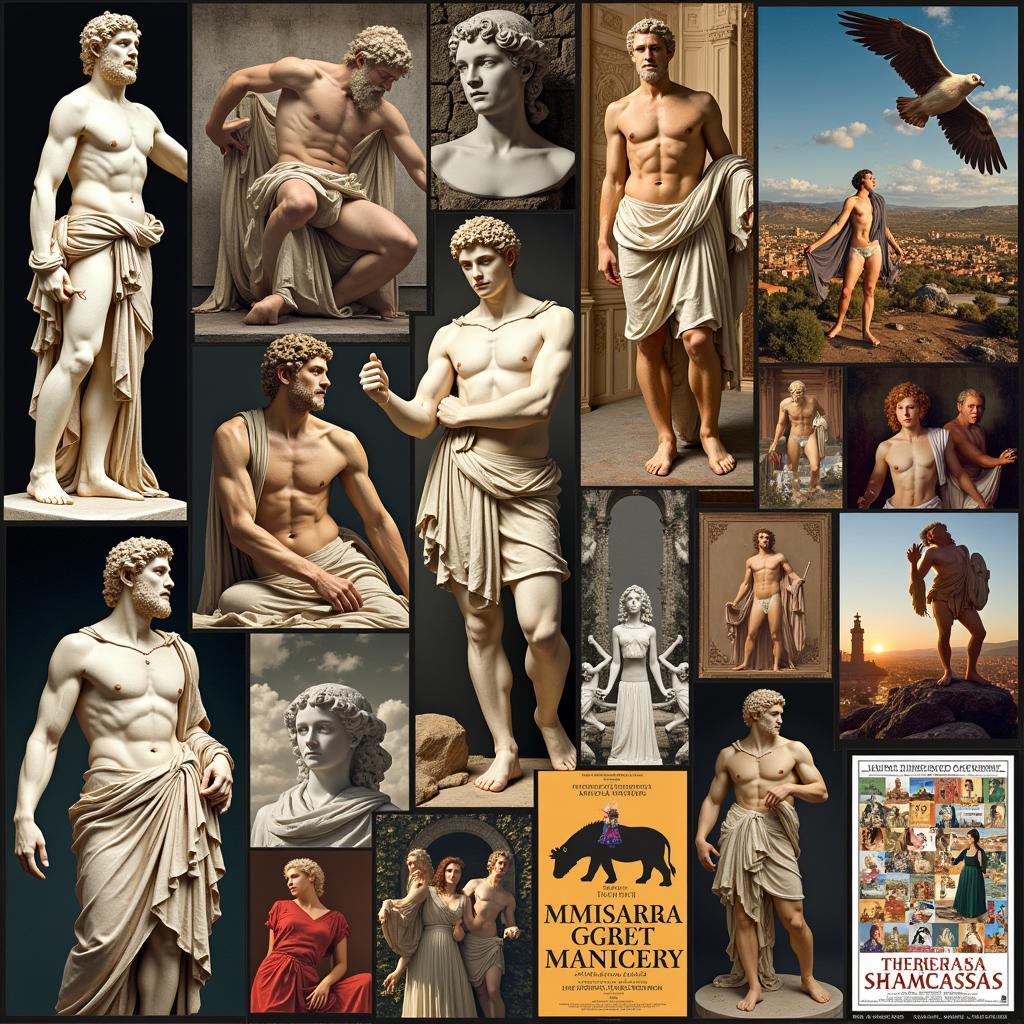From the towering skyscrapers of New York City, inspired by the grandeur of Mount Olympus, to the ubiquitous swoosh logo of Nike, a nod to the winged goddess of victory, Greek mythology permeates the very fabric of modern society. Though ancient tales spun by bards and etched onto crumbling scrolls may seem worlds away from our digital age, their influence resonates deeply, shaping our language, art, literature, and even our understanding of the human condition.
 The enduring influence of Greek mythology on modern society, from language and art to psychology and everyday expressions.
The enduring influence of Greek mythology on modern society, from language and art to psychology and everyday expressions.
The Echoes of Olympus in Our Everyday Lives
We encounter the legacy of Greek mythology daily without even realizing it. The names of planets, constellations, and even the days of the week pay homage to the Olympian gods. Our language is peppered with phrases and idioms rooted in these ancient narratives, from “Achilles’ heel,” signifying a weakness, to “Pandora’s box,” representing unforeseen consequences. The Titans of industry, the Herculean effort required to complete a difficult task, or the Sisyphean nature of repetitive labor – these expressions are a testament to the enduring power of Greek mythology to capture universal truths about the human experience.
Shaping Artistic Expression: From Canvas to Cinema
Greek mythology has served as an endless wellspring of inspiration for artists across centuries and continents. Renaissance masters like Michelangelo and Botticelli immortalized mythical scenes on their canvases, while Romantic poets like Keats and Shelley found their muses in the tragic heroes and star-crossed lovers of Greek lore. Today, Hollywood blockbusters and bestselling novels continue to draw upon these ancient narratives, reimagining them for contemporary audiences and demonstrating their timeless appeal.
 The pervasiveness of Greek mythology in art, literature, and cinema, spanning across centuries and captivating diverse audiences.
The pervasiveness of Greek mythology in art, literature, and cinema, spanning across centuries and captivating diverse audiences.
Psychological Insights and Archetypal Patterns
Beyond the realm of art and language, Greek mythology has profoundly impacted the field of psychology. Carl Jung, a prominent psychiatrist, developed the concept of archetypes, universal patterns of behavior and personality, drawing heavily from Greek myths. Figures like Oedipus, Antigone, and Narcissus have become synonymous with specific psychological complexes, their stories offering insights into the complexities of human motivation and behavior.
A Legacy of Ethical and Philosophical Inquiry
The tales of Greek mythology are not mere stories for entertainment; they are imbued with profound ethical and philosophical dilemmas that continue to resonate with us today. The myth of Prometheus, who stole fire from the gods to give to humanity, sparks questions about the nature of progress and the consequences of defying authority. The tragic tale of King Midas, granted the power to turn everything he touched into gold, serves as a cautionary reminder about the dangers of greed and the true value of what truly matters in life.
A Bridge Across Cultures and Time
Perhaps most importantly, Greek mythology serves as a bridge across cultures and time, connecting us to a shared human heritage. These stories, with their timeless themes of love, loss, betrayal, and redemption, transcend geographical boundaries and cultural differences. They offer a lens through which we can better understand ourselves, our place in the world, and the complexities of the human experience.
Conclusion: The Enduring Allure of Ancient Tales
The enduring influence of Greek mythology on modern society is undeniable. From the language we speak to the art we create, these ancient stories continue to shape our world. By understanding the profound impact of Greek mythology, we gain a deeper appreciation not only for the richness of ancient culture but also for the enduring power of storytelling to connect us across time and inspire generations to come.
FAQs: Delving Deeper into Greek Mythology’s Influence
1. What are some common examples of words and phrases derived from Greek mythology?
Many everyday words and phrases have roots in Greek mythology, such as “narcissistic,” “titanic,” “Herculean,” “Pandora’s box,” and “Achilles’ heel.”
2. How has Greek mythology influenced modern psychology?
Carl Jung’s concept of archetypes, universal patterns of behavior, drew heavily from Greek myths, with figures like Oedipus and Narcissus representing specific psychological complexes.
3. Why is Greek mythology still relevant today?
Greek mythology explores timeless themes of love, loss, heroism, and the human condition, making it relevant across cultures and time periods.
4. How do modern adaptations of Greek mythology differ from the original stories?
Modern adaptations often reinterpret the themes and characters of Greek myths to reflect contemporary values and concerns, offering new perspectives on ancient stories.
5. Where can I learn more about the influence of Greek mythology?
Numerous books, websites, and documentaries explore the pervasive influence of Greek mythology on art, literature, language, and psychology.
Need Assistance?
Contact us for any inquiries or assistance:
- Phone: 02043854663
- Email: [email protected]
- Address: Khu 34, Bắc Giang, 260000, Việt Nam
Our dedicated team is available 24/7 to help you.